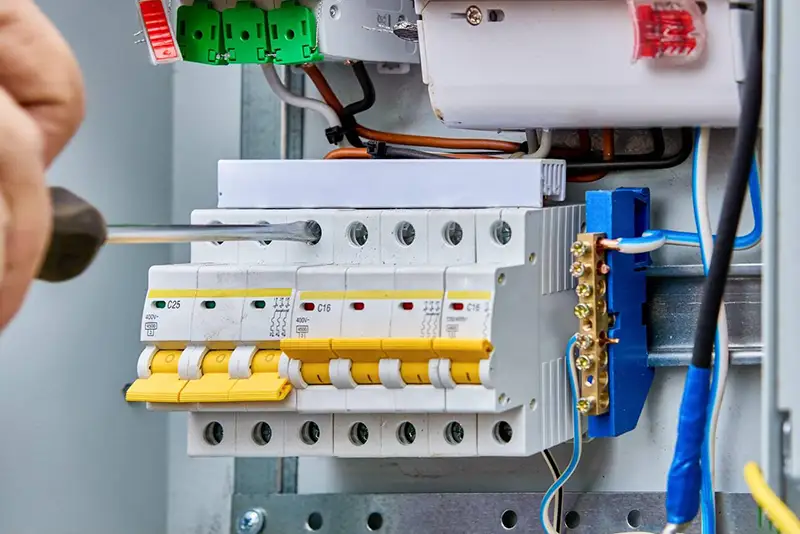Thinking about upgrading your electrical service but uncertain about the costs?
Beyond the initial price, several factors impact the total, including your current system’s condition, permit fees, and labour—especially if your home’s layout presents challenges.
Material choices and brand preferences also play a role in the final expense.
So, how do you find the best value without sacrificing quality?
There are smart strategies to help manage costs and make informed decisions for this essential upgrade.
Factors Affecting the Cost of an Electrical Service Upgrade
Several factors can influence the cost of an electrical service upgrade:
Existing Electrical System:
- Age of the System: Older systems may require more extensive upgrades, including replacing outdated wiring and panels.
- Current Amperage: The existing amperage will determine the scope of the upgrade.
Scope of Work:
- Amperage Increase: A significant increase in amperage will require larger service cables and a more powerful panel.
- Additional Circuits: Adding new circuits for specific appliances or rooms can increase costs.
- Panel Replacement: If your current panel is outdated or damaged, it may need to be replaced.
Material Costs:
- Wiring: The type of wiring (copper or aluminium) and its gauge will affect the cost.
- Panel: The size and features of the new panel will influence the price.
- Conduit: The amount of conduit required for the installation.
Labour Costs:
- Complexity of the Work: Complex installations, such as underground wiring or difficult access, can increase labour costs.
- Regional Rates: Labour rates can vary depending on your location.
- Permit Fees: Local permit fees can add to the overall cost.
By understanding these factors, you can better estimate the cost of your electrical service upgrade and make informed decisions.
Breakdown of Electrical Service Upgrade Costs
When budgeting for an electrical service upgrade, it’s essential to understand the various factors that contribute to the overall cost.
Here’s a breakdown of the main expenses involved:
Labour Costs:
- Hourly Rate: Electricians generally charge an hourly rate for their services.
- Project Complexity: The intricacies of the project, such as the number of circuits, the length of wiring, and any specific requirements, can impact labour costs.
Material Costs:
- Wiring: The type and quantity of wiring needed, including the gauge and length, affect costs.
- Circuit Breakers: Costs vary based on the number and type of circuit breakers required.
- Electrical Panel: The size and features of the new panel contribute to the overall expense.
- Conduit: The type and amount of conduit necessary to protect the wiring.
- Other Materials: Smaller items such as wire nuts, boxes, and screws are also included in material costs.
Permit Fees:
- Local Regulations: Fees differ based on local regulations and the project’s scope.
- Inspection Fees: Fees are required for inspections by local authorities to ensure compliance with electrical codes.
Additional Upgrades:
- Smart Home Integration: Adding smart home devices or systems may increase the overall cost.
- Outdoor Lighting: Installing outdoor lighting is an additional expense to consider.
- Specialised Wiring: High-voltage or specialised wiring often requires added expertise and materials, impacting the total cost.
By understanding these cost factors, you can make informed decisions and budget effectively for your electrical service upgrade.
Consulting a qualified electrician is recommended to obtain an accurate estimate tailored to your specific project.
Tips to Save Money on Your Electrical Service Upgrade
Here are some practical ways to reduce costs on your electrical service upgrade:
Timing is Key
- Off-Peak Seasons: Schedule the upgrade during off-peak times when demand is lower, often leading to more competitive prices.
- Avoid Holidays and Weekends: Choose weekday appointments, which are generally more affordable than work scheduled on holidays or weekends.
Get Multiple Quotes
- Compare Prices: Gather quotes from several qualified electricians to find the best value.
- Ask Questions: Don’t hesitate to enquire about their experience, pricing structure, and the scope of work included.
DIY Prep Work
- Clear the Area: Remove any obstructions or clutter that may slow down the electrician’s work.
- Identify Key Components: Locate the main breaker and any existing circuit breakers to help make the process quicker.
Consider Upgrading Existing Panels
- Panel Replacement Alternatives: Assess if your current panel can be updated with additional circuit breakers, rather than opting for a full replacement.
- Consult an Electrician: An electrician can advise on whether upgrading your existing panel will meet your needs.
Explore Financing Options
- Payment Plans: Ask your electrician or contractor about payment plans or financing options.
- Home Improvement Loans: Consider a home improvement loan to spread out the upgrade costs over time.
By following these tips, you can save on your electrical upgrade without compromising on quality or safety. Always prioritise safety and use a licensed electrician for any electrical work.
Upgrading your electrical service can be a smart investment in your home’s safety and functionality, but it’s essential to plan carefully and budget wisely.
By understanding the factors that impact costs—such as labour, materials, and permit fees—you can make informed decisions that help keep expenses manageable.
Seeking multiple quotes, considering off-peak scheduling, and exploring financing options can all help reduce costs without compromising on quality.
Always prioritise safety and ensure that a licensed electrician completes the upgrade to maintain compliance with local codes and ensure a reliable, long-lasting installation.

